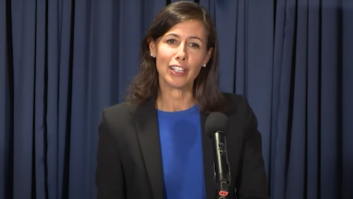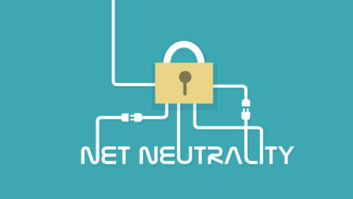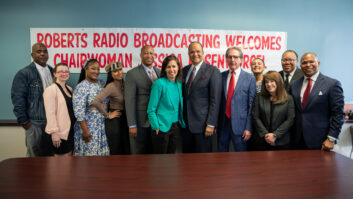FCC Chairwoman Jessica Rosenworcel didn’t waste any time once she had a 3-2 Democratic majority in place; she went to the National Press Club and proposed to restore net neutrality rules.
She also issued a remarkable appeal for calm in the debate that is sure to follow. “In the past, when this subject came up, we saw death threats against Chairman Pai and his family. … We had a fake bomb threat called in to disrupt a vote at the agency. We had protesters blocking Chairman Wheeler in his driveway and keeping him from his car. We saw a dark effort to tear down a pro-net neutrality nominee for the agency.”
Rosenworcel shared with her colleagues a notice of proposed rulemaking. If it is approved at the FCC’s October meeting, the agency will begin a new rulemaking to take public comment and reply comments on the proposal. Adopting final rules would also require a majority vote of the bipartisan FCC.
Below is the full text of her remarks as prepared for delivery. You can watch the speech at bottom.
It was more than three years ago when the COVID virus reached our shores and upended daily life. Do you remember those early days? It was bewildering. We were told to stay home, hunker down, and move life online. So I grabbed what I thought was important at work and moved my office to my dining room table. At home, I kept changing the location of the Wi-Fi router, feverishly trying to identify the sweet spot where the signal would reach everyone in my family. We had two parents, two kids, a too-crowded house, and all of us on the internet, all the time. It was a lot. And we were lucky.
Because so many others were digitally disconnected. We had people sitting in cars in parking lots to catch a free wireless signal for work and health care appointments. We had kids lingering outside of fast food restaurants with laptops just to go online for class. We had cities and towns fearful they would never thrive without new efforts to extend broadband to their residents and businesses.
As a Nation, we responded to this crisis in an extraordinary way. We made a historic commitment to broadband for all. Congress invested tens of billions of dollars into building out our internet networks and making access more affordable and equitable, culminating in the investment of $65 billion in the Bipartisan Infrastructure Law. The Federal Communications Commission is a part of this big effort to close the digital divide, with our initiative mapping where broadband is and is not in every community and our work helping 21 million households get online and stay online through the Affordable Connectivity Program.
But the pandemic did something else. It made it crystal clear that broadband is no longer nice-to-have; it’s need-to-have for everyone, everywhere. It is not a luxury. It is a necessity. It is essential infrastructure for modern life. No one without it has a fair shot at 21st century success. We need broadband to reach 100 percent of us—and we need it fast, open, and fair.
Yet even as our society has reconfigured itself to do so much online, our institutions have failed to keep pace. Today, there is no expert agency ensuring that the internet is fast, open, and fair.
Since the birth of the modern internet, the FCC had played that role. It makes sense. These are principles that have deep origins in communications law and history. After all, back in the era when communications meant telephony, every call went through, and your phone company could not cut off your call or edit the content of your conversation.
Now fast forward to the present. Communications means a lot more than just phone calls. It means access to the internet because broadband is the most important infrastructure of our time. But as a result of the previous FCC’s decision to abdicate authority, the agency charged with overseeing communications has limited ability to oversee these indispensable networks and make sure that for every consumer internet access is fast, open, and fair.
That’s not right.
Because for everyone, everywhere to enjoy the full benefits of the internet age, internet access should be more than just accessible and affordable. The internet also needs to be open—and that is what I want to focus on today.
The internet’s open design is revolutionary. It means creating without permission, building community beyond geography, organizing without physical constraints, consuming content you want when and where you want it, and cultivating ideas not just around the corner but around the world.
I believe it is essential that we sustain this foundation of openness—and that is why, for as long as I have served on the FCC, I have supported net neutrality.
At this point, I think it is worth acknowledging that net neutrality is one of the most widely discussed telecommunications issues of the internet age. But the debate around it has routinely yielded more heat than light. So I am going to keep my comments on this topic to the point and focused on the facts.
It starts with a little history. Roll back before the pandemic. Before the smartphone era. Before the Washington football team was called the Commanders.
Let’s start in 2005. That was when the FCC adopted its first open internet policy statement built on the policies that had long been in communications law and history. The agency made clear that when it came to net neutrality, consumers should expect that their broadband providers would not block, throttle, or engage in paid prioritization of lawful internet traffic. In other words, your broadband provider had no business cutting off access to websites, slowing down internet services, and censoring online speech. Your broadband provider was not allowed to play favorites, like steering you fast to some online sites and services because they got a payout, and consigning you to a bumpy and slow road to reach all others. As a consumer, you could go where you want and do what you want on the internet without your broadband provider getting in the way and making choices for you.
After ten years of policymaking and three rounds of litigation, in 2015 the FCC finally adopted net neutrality protections that were upheld by the courts. The FCC had produced open internet policies that passed judicial muster. We had clear rules of the road—and those rules were popular. Eighty percent of Americans support open internet policies.
This appeared to be the end of the net neutrality saga.
But no. Because in 2017 the last administration took it up again and did something different. It announced that it would break with over a decade of consistent FCC policy and repeal the FCC’s open internet rules. The public backlash was overwhelming. People lit up our phone lines, clogged our e-mail in-boxes, and jammed our online comment system to express their disapproval.
Despite overwhelming opposition from the public, the FCC repealed net neutrality. In fact, the FCC’s actions were so extreme that the United States Senate voted to restore the agency’s open internet protections.
I believe this repeal of net neutrality put the agency on the wrong side of history, the wrong side of the law, and the wrong side of the public. It was not good then, but it makes even less sense now. It determined that this infrastructure—which the pandemic proved so essential for modern life—needs no oversight. I think that’s wrong.
So today we begin a process to make this right. This afternoon, I am sharing with my colleagues a rulemaking that proposes to restore net neutrality.
This is a first step. When we vote on this rulemaking, we will invite public comment about how restoring net neutrality rules can help ensure internet access is fast, open, and fair. We will seek to develop an updated record on the best way to restore a uniform, national open internet standard.
I recognize the fact that we are kicking off this rulemaking to explore how to reestablish net neutrality rules will be the headline here. But, while I have your attention, there is more I want to share today.
The repeal of net neutrality rules was problematic not only because it wiped away enforceable, bright-line rules to prevent blocking, throttling, and paid prioritization. It was problematic because when the agency reversed the decision to oversee broadband internet access as a “telecommunications service” under Title II of the Communications Act it had a lot of downstream consequences—and we should talk about them.
I recognize that last sentence may have no meaning to most outside of Washington. So let me unpack it. Title II is the part of the law that gives the FCC clear authority to serve as a watchdog over the communications marketplace and look out for the public interest. Title II took on special importance in the net neutrality debate because the courts have ruled that the FCC has clear authority to enforce open internet policies if broadband internet is classified as a Title II service.
Providing a strong foundation for net neutrality rules is a good reason to support classifying broadband internet as a Title II service. But again, there are downstream consequences that flow from the agency retreating from Title II. They need attention.
Let me explain.
Back to the pandemic. It made clear that broadband is essential infrastructure for modern life. Access to the internet is now access to everything. And common sense tells us the Nation’s leading communications watchdog should have the muscle it needs to protect consumers and make sure their internet access is fast, open, and fair.
Common sense also tells us a thing or two about the state of competition in the broadband marketplace. I am a big believer in the power of competitive markets to drive innovation, investment, and consumer benefits. But I also know the high cost of entry makes competition a challenge in many places. That is why almost half of us lack high-speed service with 100 megabit-per-second download speeds or can only get it from a single provider. In fact, only one-fifth of the country has more than two choices at this speed. So if your broadband provider mucks up your traffic, messing around with your ability to go where you want and do what you want online, you can’t just pick up and choose another provider. That provider may be the only game in town. You need a referee on the field looking out for the public interest—and ensuring your access is fast, open, and fair.
On issue after issue, reclassifying broadband as a Title II service would help the FCC serve the public interest more efficiently and effectively.
Start with public safety. In its remand of the FCC’s decision to roll back net neutrality, the court found the agency’s “disregard of its duty to analyze the impact of the public safety renders its decision arbitrary and capricious.” I agree.
The record before the court demonstrated that when firefighters in Santa Clara, California were responding to wildfires they discovered that the wireless connectivity on one of their command vehicles was being throttled. As a result of Title II repeal, the FCC lacked the authority to intervene.
Title II would also bolster our authority to require internet service providers to address internet outages. This really hit home for me when I visited Detroit last year. I heard about Hope Village, a neighborhood of about 6,700 people that suffered through a 45-day internet outage during the pandemic and had little recourse. Because remember, when the FCC backed away from overseeing broadband, the only mandatory outage reporting system we can have in place is focused on long distance voice outages. Let me submit to you in a modern economy—and during the pandemic—collecting only data about when the voice system goes down does not cut it.
Look at national security. The FCC has taken a series of bipartisan actions to reduce our dependence on insecure telecommunications equipment and keep potentially-hostile actors from connecting to our networks. This is good. But it is not enough to keep our adversaries at bay. Today when we strip away authorization to provide service in the United States from state-affiliated companies who may wish to do us harm, we take away what is known as their Section 214 authority. But remember, thanks to the retreat from Title II in the last administration, that authority does not cover broadband. This is a national security loophole that needs to be addressed.
Look at cybersecurity. The FCC is actively involved in federal interagency cybersecurity planning, coordination, and response activities. You want the expert agency with network experience sitting at that table. But without reclassification, the FCC has limited authority to incorporate updated cybersecurity standards into our network policies.
Look at network resilience and reliability. We want to make sure our communications networks hold up during emergency situations like natural disasters. Title II could help us to better monitor the degradation of service in times of emergency, with the kind of required outage reporting I mentioned earlier.
Look at privacy. The law requires telecommunications providers to protect the confidentiality of the proprietary information of their customers. That means that these providers cannot sell your location data, among other sensitive information. Those privacy protections currently extend to phone service customers but not broadband subscribers, because Title II does not cover the latter. Does that really make sense? Do we want our broadband providers selling off where we go and what we do online? Scraping our service for a payday from new artificial intelligence models? Doing any of this without our permission?
Look at broadband deployment. As a Nation we are committed, post-pandemic, to building broadband for all. So keep in mind that when you construct these facilities, utility poles are really important. Title II gives cable and phone companies rights to attach their facilities to utility poles when they deploy service. But when the FCC rolled back its open internet rules, it eliminated the pole attachment rights of broadband-only providers. If you want build out and competition, this is not good. It needs to be fixed.
Look at robotexts. Along with robocalls, they are a big source of consumer complaints to the FCC. One thing we have learned about the bad actors behind this junk is that they are constantly evolving their techniques to reach us with their scams and fraud. Title II authority would give us the maximum flexibility to counter this threat—and evolve our approaches as technology changes.
To be clear, the FCC is actively engaged on all of these issues. But at times it can require duct tape and bailing wire to jerry-rig the justifications to make sure our actions are on solid legal footing. It doesn’t always work. And it renders unnecessarily vulnerable some of our most important security efforts. Reclassification of broadband as a Title II service would make FCC work more efficient and effective—and consumers more confident their internet access is fast, open, and fair.
On top of this, restoring our open internet policies will mean that a uniform legal framework applies to the whole country. Because if you think that nothing has happened since the FCC retreated from net neutrality and are asking yourself what is the big deal, think again. Then look harder. Because when the FCC stepped back from having these policies in place, the court said states could step in. So when Washington withdrew, California rode in with its own regime. Other states, too. They put net neutrality rules in state law, executive orders, and contracting policies. So in effect, we have open internet policies that providers are abiding by right now—they are just coming from Sacramento and places like it. But when you are dealing with the most essential infrastructure in the digital age, we benefit from one national policy. All of this means we are not choosing between net neutrality rules and no rules. We are discussing one national standard or a patchwork of state regulations.
Having gone through this drill before, I know that a small, but vocal chorus of naysayers is surely already raising their objections.
They say Title II is heavy-handed. And if we were seeking comment on applying Title II to broadband in its entirety, they might have a point. But instead, we are proposing a light touch. Back in 2015, when the FCC last had net neutrality rules upheld by the courts, the FCC chose to forbear from 27 provisions of Title II of the Communications Act and over 700 agency regulations for broadband and broadband providers. We are sticking with that approach.
They say this is a stalking horse for rate regulation. Nope. No how, no way. We know competition is the best way to bring down rates for consumers. And approaches like the Affordable Connectivity Program are the best bet for making sure service is affordable for all.
They say nothing bad has happened. Again, states stepped into the void created by the FCC retreating from net neutrality. I think it is time for Washington to step back in with a national policy to make sure internet access is fast, open, and fair.
So what happens next? On Thursday, I will release the full text of this rulemaking. It seeks comment on putting back in place policies to prevent your broadband provider from engaging in blocking, throttling, and paid prioritization along with a general conduct rule that prohibits your broadband provider from unreasonably interfering or unreasonably disadvantaging consumers from going where they want and doing what they want online. For consumers, this means internet openness, security, safety—and one nationwide net neutrality standard they can count on. Three weeks later, on October 19, I will ask my colleagues to vote. And, if we get at least three votes to kick off this rulemaking, I promise you I will do a lot of listening. We all need to have an open mind and would all benefit from a fresh record on this subject.
As we move forward, I also would like to make a plea. I have every expectation that this process will get messy at times. I have seen the agency bring up net neutrality before and believe peaceful protests are a sign of a healthy democracy. What I worry about is when things get ugly. In the past, when this subject came up, we saw death threats against Chairman Pai and his family. That is completely unacceptable, and I am grateful to law enforcement for bringing the individual behind these threats to justice. We had a fake bomb threat called in to disrupt a vote at the agency. We had protesters blocking Chairman Wheeler in his driveway and keeping him from his car. We saw a dark effort to tear down a pro-net neutrality nominee for the agency.
I recognize that those who go to these extremes are not listening to or reading these remarks. But those of you who are set the tone for this debate. So make some noise. Raise a ruckus. But keep it in the lines.
Above all, keep speaking up. We are here now because so many people let the agency know this issue matters. We are here now because the COVID pandemic taught us—with painful clarity—just how important broadband access is in modern life. In the United States, we have made a historic commitment to ensure high-speed internet access reaches all. We have invested in this infrastructure like never before. Now let’s make sure it is fast, open, and fair for consumers everywhere.
Thank you.
Here is the video from the FCC YouTube channel.











